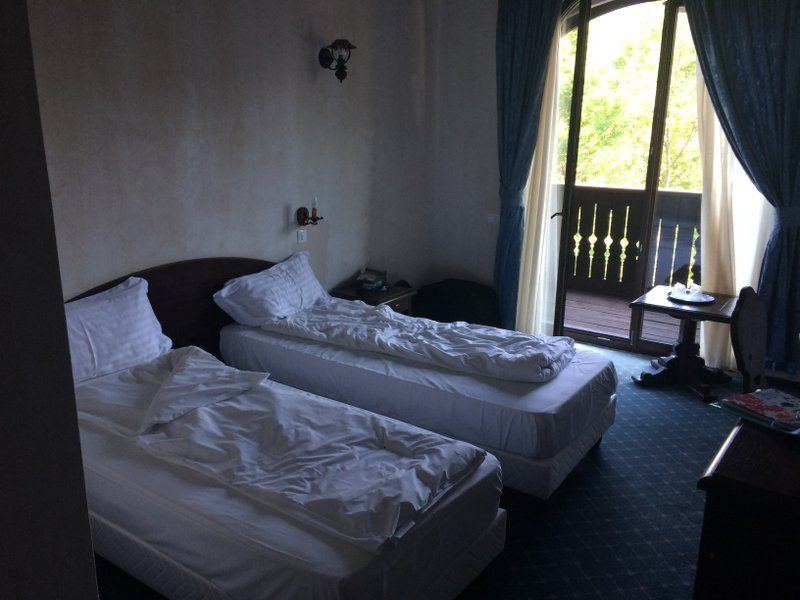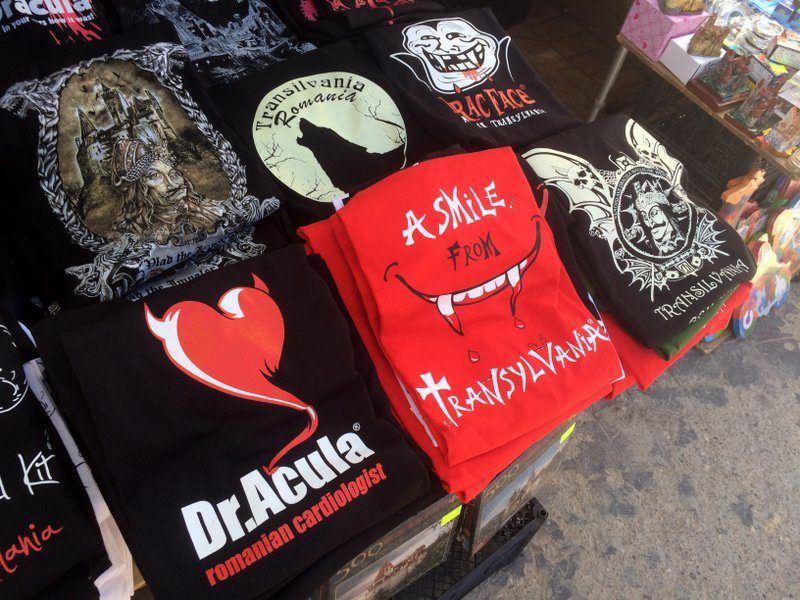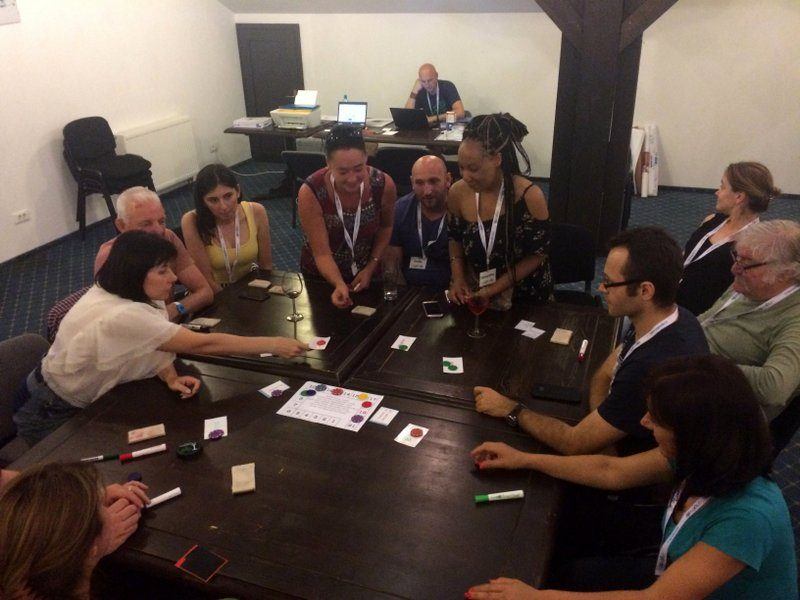Long time readers know I used to teach English back in Korea from 2008 to 2013. New readers? Now you know. Years before I became One Weird Globe, I was Chris in South Korea, teaching English to Korean kids (and some adults) while living in Seoul. I haven’t taught English since Korea, though, having focused on the blog, writing books, and more recently making tabletop / board games.
Fast forward to July 2017, when a friend I made in Croatia told me about Angloville. The setup, as it was explained, is simple. As a teacher, you get a free hotel room, three meals a day, and the chance to make some new friends. Oh, and a free ride to the venue and perhaps a side trip somewhere along the way. In exchange, you offer your time as a conversation partner to the local (non-native) English speakers.
They’re there to learn, she said, but also to be immersed in the goings-on that happened when you spend most of your waking day together. Put more succinctly, it’s much like an English immersion camp for adults (though Angloville also does similar programs for kids).
A bit of research later, I told her I’d apply. In my application, I mentioned how I used to teach English in Korea and that I’d be looking forward to playing some of my games with anyone that wanted to try them out. I got accepted (even as a unpaid volunteer, the program has some standards) and ultimately made plans to attend.
On we went via minivan to a three-star hotel in Bran, Romania. The three-hour trip gave the ten or so native English speakers a chance to get to know each other. Contrary to my expectations, the group is a wide variety of ages, from 23 years old up to a couple of 60-somethings, and from several different countries. The US and the UK are well-represented, with one native English speaker originally from Kenya as well.
The Sunday-to-Friday schedule is a packed one — and classes began just hours after arriving. I learned later that the Romanian students are promised 70 hours of instruction, though only about 30 of those hours are formal classes with a native speaking teacher. The rest of the time is stuff like meals, entertainment, free time, and the like. For want of a better term, Monday through Thursday were ‘full’ days, while Sunday and Friday had only one or two classes amidst arriving or departing.
Each morning after breakfast, you meet with your mentee, a local student who’s tasked with preparing a presentation at the end of the camp. After that, head up to the conference room and check the schedule. There are about the same number of Romanian students as there are native-speaking teachers, and the schedule was carefully set up to ensure each native teacher would meet with each local student at least once.
You’re given a half-page (A5) sheet with some topics and conversation starters based on their level (another thing we’ll get to in a minute), then encouraged to find them and get started with a 50 minute conversation session.
For the most part, these are comfortable enough — these are adults that attend of their own free will, and all are there to practice their speaking and listening skills. If you’ve taught kids that didn’t want to be there, that struggle is gone here.
A handful of sessions varied from that one-on-one format — a couple two-on-two sessions, a negotiation session, a ‘phone’ session — but for the most part engaged the student in both speaking and listening.
The ability to pull these off depended heavily on the student’s level… and this is where the ugly head of ‘level’ began to show up. Angloville follows the CEFR leveling system (essentially A1 through C2, though students I met were B1, B2, and C1 categories). During a brief native-teachers-only, we were told women often underestimate their level, while men often overestimate their level… so be prepared for that. The materials we were given were based on that self-reported level, however.
For the teachers, that often trying to tailor the scenario to a level the student would understand… only to realize they’re barely comprehending things… The staff managed to handle a couple of outlier cases on the fly (basically by translating the English prompts into Romanian for them to read before responding in English). I got the sense there’s a pretty standard schedule across all or most Anglovilles — the prompts will change, but the general gist / order of things is the same.
As a surprise to the students, one morning’s classes were replaced with a treasure hunt / scavenger hunt on a walk towards Bran Castle (the supposed birthplace of Vlad the Impaler AKA Dracula). Since the venue was listed as being quite close to the castle, I had already researched and dismissed this place as too touristy… and my suspicions were confirmed as we approached the entrance. A large swath of souvenir sellers and long line of people waiting to buy 35 lei (about $9 USD) tickets to the castle. The group split up and otherwise enabled people to go their own way — one group took in the castle, while another headed to one of the pubs… Free of obligations, I headed back to my room and caught up a bit. Thankfully, various obligations weren’t all that critical in their deadlines.
After the presentations, a look at the scavenger hunt photos (and a rather alcohol-filled final night that brought to mind the iconic ‘what happens in Vegas stays in Vegas’ saying), the final day brought a simple ceremony and lunch before getting back into a minivan and heading back to Bucharest.
What worked:
- As expected, I had the chance to try out some of my games (see above). I learned that one of them might be deemed a little complicated by non-native speakers, while others went over quite well.
- It’s an incredibly sociable experience and a nice change in pace from the usual digital nomad life to meet people I wouldn’t otherwise have met.
What didn’t:
- Contrary to what might be mentioned on their website or once you’ve arrived, this is not a vacation and should not be thought of as such. A vacation implies you’re relaxing or otherwise have agency to decide how to spend you time, and this offers neither of those.
- The venue left some things to be desired. Despite being a ‘three-star hotel’, there wasn’t a fan or air-conditioner in sight on what went down as one of the hottest weeks of the summer.
- Angloville asks students to self-rate their English skills — and not all of them were able to hold a conversation. That meant for some students it felt much more like a class than a conversation.
- It’s an incredibly sociable experience. With the exception of that aforementioned ‘free time’, you’re with and around the students and other teachers for the vast majority of the day. Even for a strong extrovert like myself, I found myself wanting some quiet time by myself by the end of the second day.
- I couldn’t shake the feeling that I was giving out (in time / energy) far more than I was getting back. Laura and I already had an Airbnb in Bucharest, and this is Romania — food is cheap. There’s something to be said about meeting new people, but again, I’m already doing that on a regular basis. For the price of a (shared) hotel room and some meals, the Romanian students got around 70 hours of English exposure (with around 30 of those hours in the one-on-one variety) — each of which paid around $1,000 US for the program.
- For folks that aren’t active English teachers or volunteers, most of the other incentives Angloville offers may hold little interest. They’ll give you a positive reference on your preferred platform (think Workaway or Helpx) or partially fund a TEFL certification course after you’ve completed several programs… neither of which held any personal appeal.
The verdict?
I’m glad I did it, but I probably won’t do it again.
If you’re currently an English teacher or volunteer working abroad: recommended. Take full advantage of the offered references to strengthen your profile and enjoy the change of pace.
If you’re currently a digital nomad: recommended, with reservations. There’s a couple of hours scheduled as ‘free time’ after lunch most afternoons… but by this time you’ll have spent your morning in various classes, acclimating to a different schedule, and is that a pool…? If you have paying work with specific or tight deadlines, or if your gigs are tough to step away from for almost a week, this is probably not for you.
If you’re a businessperson / entrepreneur running a business while living abroad: not recommended. The dozens of hours spent volunteering aren’t likely to translate to revenue for your business, and may simply equate to time spent away from your business or being unable to respond to issues quickly.
Like this post? Like the Facebook page!



